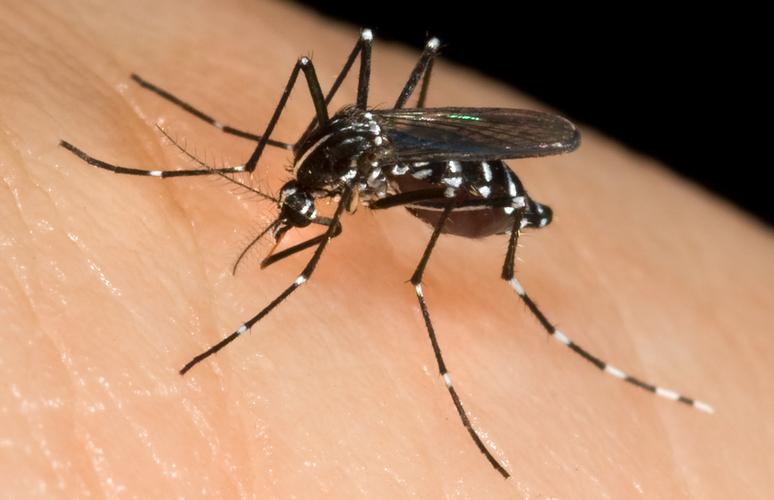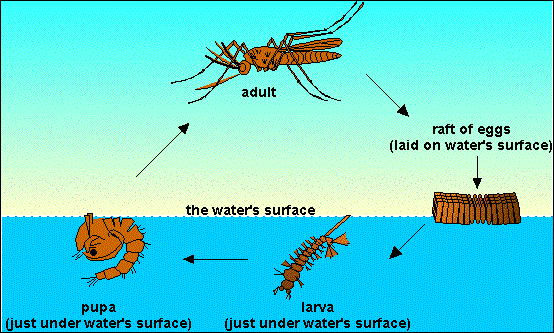
Mosquitoes
Mosquitoes are small, midge-like flies. Mosquitoes do not actually "bite" humans, rather they "feed" on humans. Female mosquitoes require protein to produce their eggs and obtain this protein from the blood of humans and other animals.
There are over 2,500 species of mosquitoes worldwide, but only 52 are found here in Connecticut, of which less than half are considered to be pest species to humans and livestock.
Lifecycle of Mosquitoes
 A mosquitoes lifecycle has four stages: egg, larva, pupa, and adult. Mosquitoes need water to breed since all mosquitoes spend their larval and pupal stages in water. Therefore, mosquitoes can always be found around water. This is why it is important to prevent stagnant water from standing around your home and apply a larvicide to areas where stagnant water cannot be removed.
A mosquitoes lifecycle has four stages: egg, larva, pupa, and adult. Mosquitoes need water to breed since all mosquitoes spend their larval and pupal stages in water. Therefore, mosquitoes can always be found around water. This is why it is important to prevent stagnant water from standing around your home and apply a larvicide to areas where stagnant water cannot be removed.Diseases Mosquitoes Carry
Mosquitoes can transmit a variety of different diseases including Zika virus, West Nile virus, Chikungunya, dengue, and malaria. For more information on these viruses and symptoms please visit the CDC's website.
How to Prevent Breeding of Mosquitoes
Mosquitoes around the home can be reduced significantly by minimizing the amount of standing water available for mosquito breeding. Residents are urged to reduce standing water around the home in a variety of ways. Source reduction activities include:
- Dispose of tin cans, plastic containers, ceramic pots or similar water-holding containers that have accumulated on your property.
- Empty standing water from used or discarded tires (pdf) that may have accumulated on your property (e.g. tire swings).
- Drill holes in the bottom of recycling containers that are left out of doors.
- Clean clogged roof gutters on an annual basis, particularly if the leaves from surrounding trees have a tendency to plug up the drains.
- Turn over plastic wading pools when not in use.
- Turn over wheelbarrows and do not allow water to stagnate in birdbaths.
- Change water in birdbaths and wading pools on a weekly basis.
- Aerate ornamental pools or stock them with fish.
- Clean and chlorinate swimming pools that are not being used. Be aware that mosquitoes may even breed in the water that collects on swimming pool covers.
- Report any standing water on private property, such as abandoned pools, to the Fairfield Health Department at 203-256-3020.
Prevention mosquito-borne diseases can be achieved by taking these simple steps:
- Don't go outside when mosquitoes are active (between dusk and dawn).
- Use mosquito repellant (Enviornmental Protection Agency (EPA) - registered insect repellant).
- Wear protective clothing such as hats, long sleeve shirt and pants.
- Keep mosquitoes outside by ensuring all screens are in good repair.
Each season, the Fairfield Health Department takes the appropriate steps to help prevent mosquito and thus mosquito-borne diseases. For details, please see our management plan.
Resources
